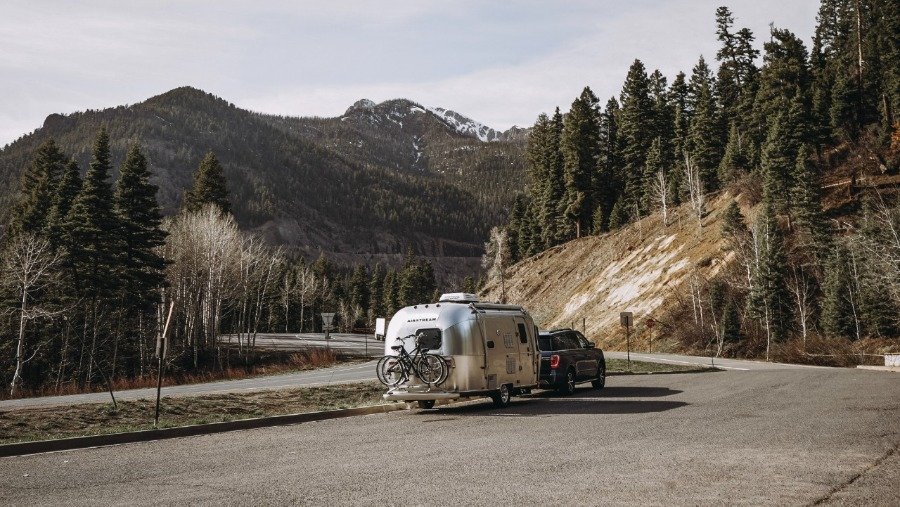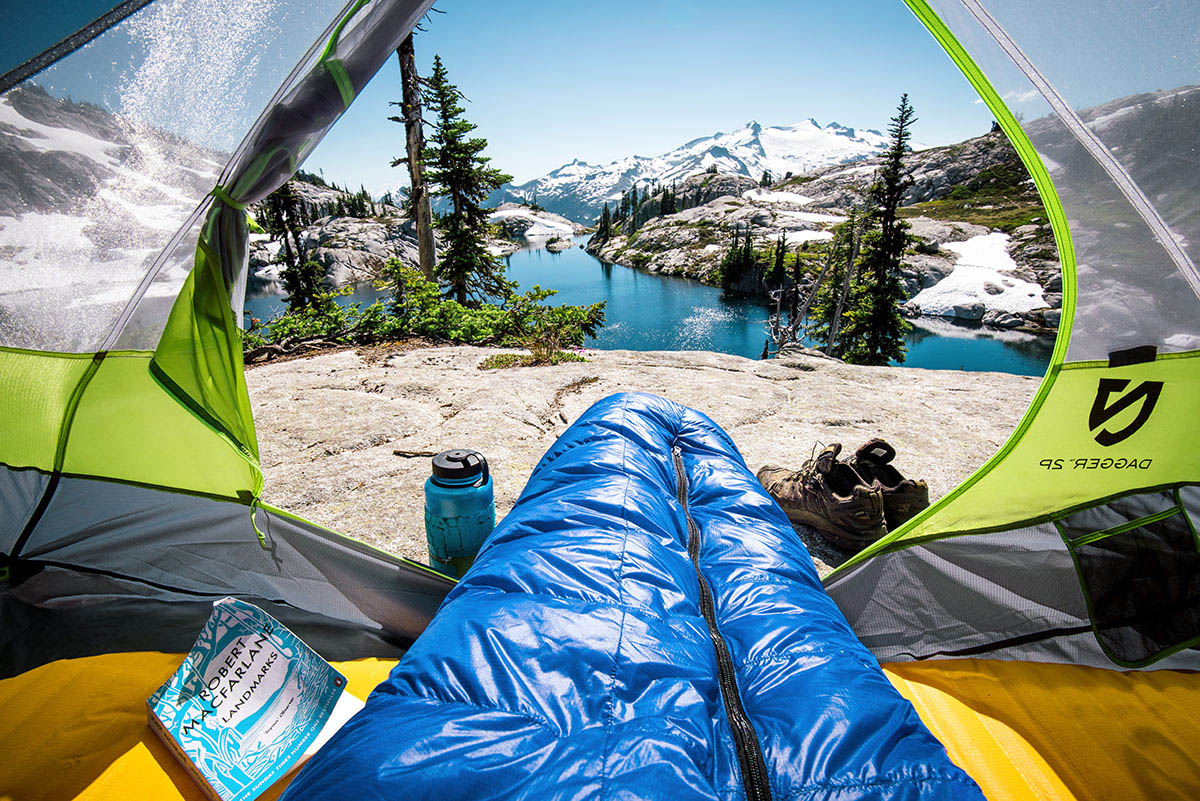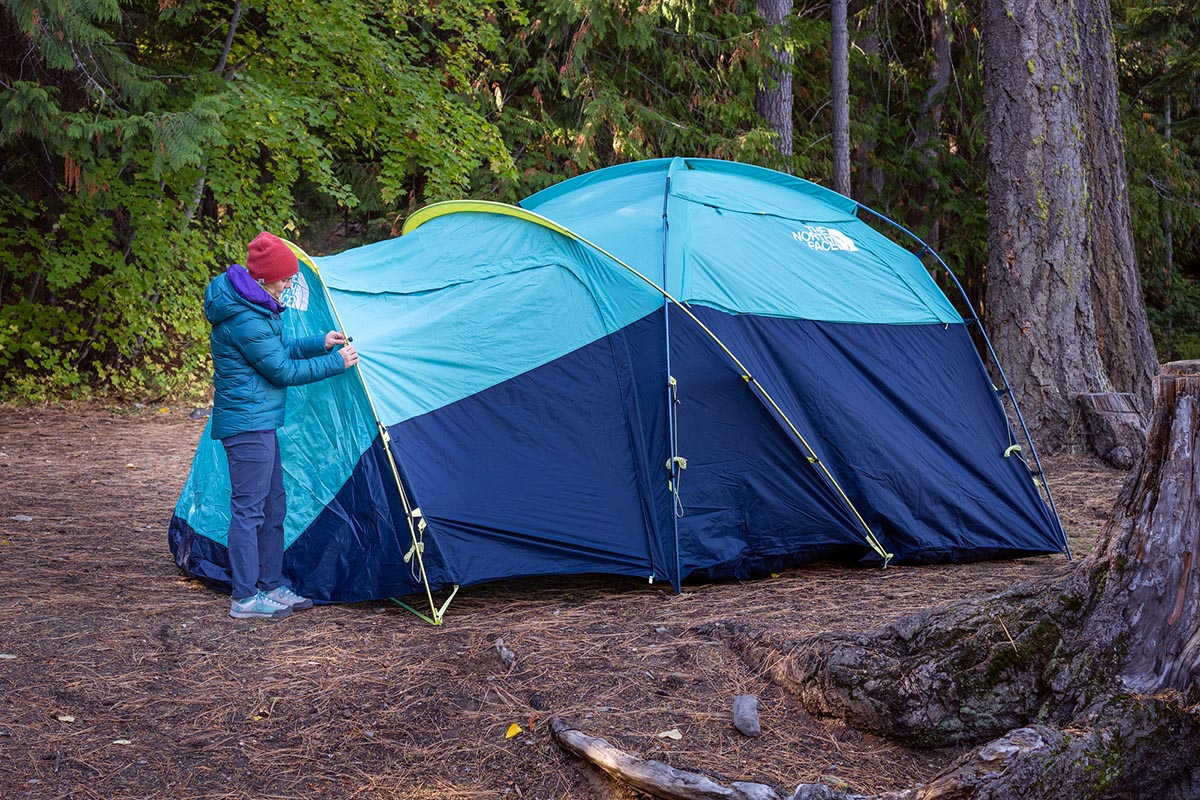YETI Roadie 48 Wheeled Cooler Review: Convenient, Portable Rolling Cooler
YETI launched the iconic hard-sided Tundra cooler more than 15 years ago and has been expanding its lineup ever since, continuing to deliver premium coolers to a hearty fan following.
Now the 2022 Roadie Wheeled Cooler joins the ranks as the brand’s second-ever cooler model that rolls, following the 2018 debut of the Tundra Haul Wheeled Cooler.
As soon as I caught wind that YETI was launching a new wheeled hard-sided cooler, I was excited to put it through test rounds.
With two-wheeled Roadie size options, a 48-quart and a 60-quart, there are officially three choices among the brand’s pull-style designs. This rolling outdoor ice-keeper provides a new unique shape, wine bottle-compatible height, and retractable handle to the lineup.
In short: The new YETI Roadie 48 Wheeled Cooler ($450) is maneuverable, easy to transport, and convenient for travel, especially for a single set of hands and trips to and from the rig and deck or camp spot.

YETI Roadie 48 Wheeled Cooler Specs
- Capacity: 48 quarts (or a 60-quart option)
- Weight: 25.8 lbs.
- External dimensions: 19.8″ W x 19.9″ D x 20.5″ H
- Internal dimensions: 14.5″ W x 11.6″ D x 15.7″ H
- Number of cans: 42 cans (including recommended 2:1 ice-to-can ratio)
- Pounds of ice: 39 lbs. (ice only)
- Size options: 48-quart ($450), 60-quart ($500)
- Features: Periscopic roller handle, two side handles, non-slip feet
- Ice retention grade: 3.5/5
- Usability grade: 4.5/5
- Overall grade: 4/5
YETI Roadie 48 Wheeled Cooler Review

GearJunkie has tested many soft coolers, backpack coolers, and traditional hard-sided coolers. Editors have melted countless bags of ice in the name of road trips, lakeside hangs, and quantitative tests in a controlled setting.
The YETI Tundra Haul Wheeled Cooler, YETI Hopper M30 Soft Cooler, and YETI Hopper M20 Backpack Cooler all topped GearJunkie’s choices across the board.
I’ve personally also done extensive testing of the RovR RollR 45-quart wheeled cooler, with a similar construction to the YETI Roadie 48 Wheeled, and the YETI Tundra 45 Cooler, both of which were top performers among dozens of coolers.
The Roadie 48 is an extension of the brand’s Roadie lineup, which includes a smaller 24-quart cooler without wheels. I used the YETI Roadie 48 Wheeled Cooler for standup paddleboarding and picnic days at a nearby mountain lake, with a 60-minute drive round-trip on 75-degree Fahrenheit summer days mixed with clouds.
I also took the wheeled cooler on a weekend road trip in the Colorado Rockies. As I traveled to the next mountain range and valley over, the temperature rose to 85-90 degrees F. I made many pitstops to hike and eat hole-in-the-wall barbecue while the cooler sat in the truck bed of a ’96 Ford F150.
Indoors, I did a controlled ice retention test in a room with little to no sunlight and moderate temperatures at 65 degrees F.
Here’s the rundown of how the new rolling cooler performed.

Seamless Retractable Handle
The periscope handle is telescopic, so the tubular sections slide into one another. It’s quick, smooth, and easy to pull out and click into place. A simple button allows you to slide the handle back down into itself.
This is a key difference from the Roadie’s big, wheeled Tundra Haul cousin, which has a large swinging aluminum handle that folds flat against the cooler’s side.
The 21-inch arm (from the base to the handle) is long and reaches my ribcage (I’m close to 5’5″). The handle is wide at 6 inches with plenty of space to choose where you place your hand.
Compared to the RovR RollR 45, the handle has some differences. The RollR‘s telescopic handle reaches 23 inches but is narrower at 3.25 inches wide. The handle is more ergonomic with two recesses near the outermost edges, which is a nice spot to set your outer fingers.
I like the feeling of this handle more, but folks with larger hands or those wearing dense working gloves might prefer the wider handle of the Roadie.
One improvement could be made: The base of the retractable handle on the Roadie has noticeable, visible play — both lateral and front-to-back movement — when it’s lengthened.
Puncture-Resistant Wheels

These wheels are a solid plastic blend and puncture-resistant, which I found to be true. They roll over gravel and dirt just fine. There are no defined lugs, but there are slight indentations on the outer edges of the wheels.
In contrast, the RovR RollR 45 has robust all-terrain rubber tires with aggressive tread and deep lugs. The tires offer great traction over ice and snow in addition to dirt, gravel, and rocks.
The biggest difference I felt while pulling the YETI Roadie was that it didn’t absorb vibrations as well, compared to rubber tires.
Comfortable Side Handles

Two smooth, deep recessed handles on each side of the Roadie are so easy to slide your hands into. These are nice handles to use for lifting the cooler into a truck bed, back seat, boat, or onto a shelf.
Each haul handle is nearly 6 inches wide, so they’re spacious. The handles are not textured nor are there any grooves for ergonomics, but they feel fine to use.
Easy Latch Closure

Compared to YETI’s trademark T-handle closures, the Roadie’s quick-latch system required less energy to open than tugging the more common rubber latches (as on the YETI Tundra 45 cooler).
On the downside, these latches pinched my fingers several times when I slid my hand behind the latch to open it — so avoid that instinct. The latch ends are slightly upturned for this purpose, so it only takes one finger to flick these open or closed.
Drain Plug

The drain plug proved to be leakproof even when 100% of the ice melted and standing water sat in the cooler. However, this cooler is built for dry-ice compatibility, so the lid is not completely leakproof, unlike the brand’s Hopper Flip Soft Cooler lineup.
When opened, the plug easily drains water with the cooler sitting upright. When I needed to drain water even faster, I’d use the extended handle to tilt the cooler for gravity assistance. Once the water reached a low level, I’d need to tilt the cooler nearly all the way flat to get the remaining water out.
Inside, there’s an interior recess beneath the plug’s port, which cups the last little bit of water. It’s fairly easy to dry up any remaining moisture here before storing the cooler.

Interior Shelf, Accessories
Along the interior edge of the cooler is a rim to hold accessories such as the dry basket, which came with the cooler. I used the dry basket for carrying ripe Colorado peaches, and it worked great.
There’s also a vertical channel for adding a divider ($30), sold separately.
Ice Retention

Testing Conditions
I was strategic with when I opened the cooler — and I would promptly close the lid each time. When the Roadie sat outside, versus stored in a vehicle, I’d roll it into the shade.
Between trips andbeforeo use, I stored the cooler in a shaded, cool room that hovers at 65 degrees F. So I did not use a sacrificial bag of ice to chill the coolerbeforeo loading it up, which YETI recommends for ideal ice preservation.
Every time I used the cooler, I loaded it one-third with ice: a 6-pound bag of frozen cubes. YETI recommends users fill the cooler two-thirds with ice and the final third available for food or beverages. I didn’t precisely follow the brand’s recommendations; rather, I wanted to test the cooler in the way we’d typically use it.
For single-day adventures, this cooler excelled. The ice remained plentiful in the cooler on warm, sunny days in the 75- to 80-degree F range and when the cooler was strategically placed in the shade. The cooler was also loaded with mostly pre-chilled cans.
For the weekend road trip, a rock-hard bag of 6-pound ice was put in the cooler. Then I filled the majority of the remaining space with food. Seven hours later, when I rolled the cooler into our cabin, half of the cooler’s ice had melted.
I hadn’t opened the cooler from point A to point B. The temperatures rose to 85 to 90 degrees F with the cooler in the back of the hard-shelled truck bed, where the lid of the Roadie may have sat in the sun for a portion of the trip. The cabin in the woods was pretty warm upon arrival with no air conditioning, and by 10 a.m. the following day, the cooler’s ice was totally melted.
I also did a controlled indoor ice retention test in a 65-degree F room with no sun and filled one-third of the cooler with cubed ice: the same amount I’d been using on other test days. That amount of ice lasted for 2 full days before being completely melted.
Ice Retention Results
Overall, I expected the Roadie to have better ice retention in the field on a multiday trip and in the ice retention test. This cooler’s walls and lid are insulated with a pressure-injected, commercial-grade polyurethane foam. Comparatively, the YETI Tundra 45 likewise has a rotomolded construction and up to 3 inches of the same insulation, and that cooler is a superhero for protecting ice. YETI confirmed, they do not publish the specific amount of insulation that’s in each product but all of the brand’s hard coolers have up to 3 inches of that polyurethane foam. My inkling is the Roadie might have less insulation than the Tundra based on our field tests.
Ultimately, plan on following YETI’s directions about loading the cooler with two-thirds ice, and even using a sacrificial bag of ice to chill the cooler beforehand, for the best outcome and ice retention.

YETI Roadie Wheeled Cooler vs. Its Competition
YETI’s two types of wheeled coolers have some big differences that boil down to various applications and user preferences.
The shape of the YETI Roadie Wheeled Cooler is more cubic and taller compared to the YETI Tundra Haul Wheeled Cooler, which is more rectangular: wider and shorter. The Roadie 48 Wheeled Cooler features an internal height of 15.7 inches, so standard wine bottles, growlers, or 2L bottles fit inside upright, which also helps streamline access in and out of the cooler.
The Tundra Haul is only available in one size, 45 quarts, at $400. The Roadie comes in 48- and 60-quart sizes with $450 and $500 price tags, respectively.
The handles differ between the two rolling coolers. The YETI Wheeled Roadie has a collapsible periscopic handle, which allows the user to expand or retract the handle as needed. When extended, the handle is tall, which increases mobility while pulling the cooler. The Haul’s handle is anchored (it folds down on the side of the cooler), rigid, shorter, and designed for towing versus high maneuverability.

Lastly, the Roadie Wheeled Cooler does not include a lockport in the corner for a shackle lock, meaning it’s not bear-proof. At $450, this could be a con for some users.
Comparatively, the RovR RollR 45 is bear-proof and compatible with a corner hole for a lock. However, that cooler is husky at 37 pounds 3.2 ounces. The volume of the RollR 45 is slightly less, but not by much, and the price is lower at $400. The biggest benefit of the Roadie to a recreationist, in addition to the overall lower cooler weight, might be the width of the handle, which is wider than the narrower grip on the RollR.

YETI Roadie 48 Wheeled Cooler Review: Conclusion
I set the bar high for this YETI Roadie cooler due to the high-end construction of other YETI designs we’ve tested. I was surprised by the slightly lower score for exterior durability and ice retention in the field.
While sliding the cooler into the back of the truck, a piece of the cooler’s surface scraped a metal clamp of our truck topper. The ding doesn’t change the performance of the cooler, but duly noted: metal and this exterior plastic face don’t play well.
Also, the ice retention in the field wasn’t the worst or best we’ve seen among hard-sided coolers, but typically YETI rises to the very top. I expected the loaded ice to last longer in the field, even if the cooler wasn’t two-thirds full when I started the day.
Overall, this cooler on wheels is a premium choice for day trips and carrying tall containers upright such as 48-ounce Nalgenes and wine bottles.
The telescoping handle is easy to operate and increases the maneuverability of a loaded cooler while making travel immensely easier, especially for a single person. And the wheeled Roadie 48 is relatively light compared to other wheeled coolers.
Ultimately, the YETI Wheeled Roadie 48 makes hauling foodstuffs faster, more comfortable, and way less work.






